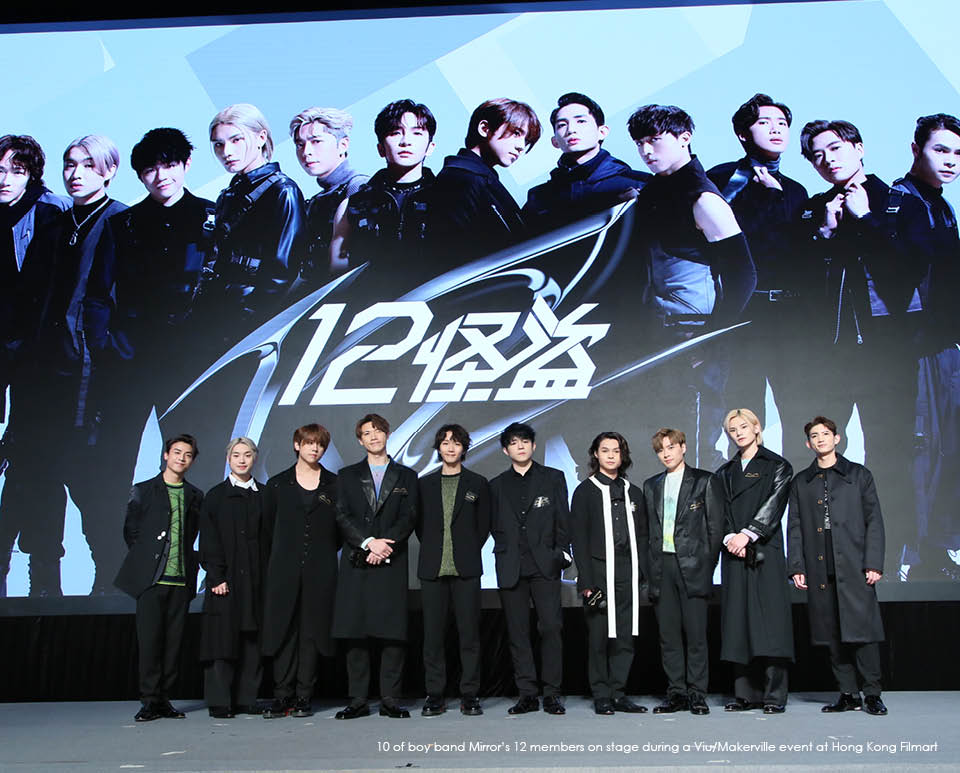
Hong Kong Filmart made something of a triumphant return last week after three years online, opening its doors to some 7,300 people for the four-day market and EntertainmentPulse conference. About 700 exhibitors – including 330 from China – from 30 countries signed up.
Although the market closed lower than 2019’s pre-pandemic 9,000 visitors from 52 countries/regions, expectations were exceeded and positive sentiment reigned. After three years online, absolutely no-one moaned about being back on the exhibition floor.
Organisers – the Hong Kong Trade Development Council – said in the closing wrap that delegates came from 41 countries and regions. The geographic spread and modest approach was evident in post-Covid pared-down but functional exhibition stands, including pavilions from Thailand, Taiwan, Korea and Japan.
Not so much for broadcasters and media companies from across China, Macau and Hong Kong, which filled their booths with everything from flowering trees and red lanterns to high-glam sparkle and a mini Kowloon City.
The bulk of both physical show floor and headspace was taken up by mainland Chinese companies, delivering a united front in support of Hong Kong and an even stronger message: promoting Chinese culture to worldwide audiences.
This was backed up by high-profile Hong Kong companies such as Emperor Motion Pictures, Viu/Makerville and other domestic shops maximising their home-ground advantages... and the pulling power of stars such as Jackie Chan and Nicholas Tse, 10 of the 12 members of boy-band Mirror brought in by Viu/Makerville, and Korean star Lee Je-hoon from Viu’s "Taxi Driver 2".
The absence of Hong Kong’s dominant broadcaster, Television Broadcasts Ltd (TVB), from the exhibitors line up was shocking at first. By day two, the explanation – budget – spread. By day three, after TVB issued a profit warning of about US$100 million, most were nodding their heads in agreement with the decision not to spend something like US$500K on a display befitting the 56-year-old broadcaster’...
Hong Kong Filmart made something of a triumphant return last week after three years online, opening its doors to some 7,300 people for the four-day market and EntertainmentPulse conference. About 700 exhibitors – including 330 from China – from 30 countries signed up.
Although the market closed lower than 2019’s pre-pandemic 9,000 visitors from 52 countries/regions, expectations were exceeded and positive sentiment reigned. After three years online, absolutely no-one moaned about being back on the exhibition floor.
Organisers – the Hong Kong Trade Development Council – said in the closing wrap that delegates came from 41 countries and regions. The geographic spread and modest approach was evident in post-Covid pared-down but functional exhibition stands, including pavilions from Thailand, Taiwan, Korea and Japan.
Not so much for broadcasters and media companies from across China, Macau and Hong Kong, which filled their booths with everything from flowering trees and red lanterns to high-glam sparkle and a mini Kowloon City.
The bulk of both physical show floor and headspace was taken up by mainland Chinese companies, delivering a united front in support of Hong Kong and an even stronger message: promoting Chinese culture to worldwide audiences.
This was backed up by high-profile Hong Kong companies such as Emperor Motion Pictures, Viu/Makerville and other domestic shops maximising their home-ground advantages... and the pulling power of stars such as Jackie Chan and Nicholas Tse, 10 of the 12 members of boy-band Mirror brought in by Viu/Makerville, and Korean star Lee Je-hoon from Viu’s "Taxi Driver 2".
The absence of Hong Kong’s dominant broadcaster, Television Broadcasts Ltd (TVB), from the exhibitors line up was shocking at first. By day two, the explanation – budget – spread. By day three, after TVB issued a profit warning of about US$100 million, most were nodding their heads in agreement with the decision not to spend something like US$500K on a display befitting the 56-year-old broadcaster’s standing but clearly not fit its bottom line.
These days TVB’s banker-bosses are all about ROI, industry insiders explain. With doubt over mainland buyers’ presence at the show because of ongoing pandemic restrictions only lifted at the 11th hour, a call was, for better or worse, taken. And then everyone moved on...
This year’s Filmart conference track ranged from a look at the “Asian wave” in 2023, dating/romance formats and Web3’s impact, along with a series of China-focused sessions organised by the International Cooperation Department of National Radio and Television Administration of China under the banner, “Chinese Global Content Communication Forum”.
The who’s who of panelists in the series included Huace group CEO, Karen Fu, who many look to as a bellwether for mainland direction. Talking about the opportunities and challenges for Chinese content in the age of streaming, China Review Studio execs said: “We don’t need exceptional stories...We need to hear the stories of ordinary people so that overseas audiences can experience their values... If we are going to succeed, we have to understand the West better than they understand us.”
The China sessions left zero doubt about grand cultural expansion plans through storytelling; a refreshed and coordinated outreach to international markets; and – an added bonus – unofficially confirmed the end of the never-official ban on Korean content.
While insiders report ongoing special quotas for Korean TV titles in China, the inclusion of Korean production house AStory ("Extraordinary Attorney Woo") boss, Nikki Semin Han, in the line-up was interpreted as a public welcome mat.
The takeaways from the Asian wave conversation included the dangers of a mishmash identity in trying to be “international”. Plus the dual purpose of Boys Love (BL) titles in smoothing the way for Thai productions internationally as well as expanding streaming-friendly repertoires.
“BL is helping Thai content to travel beyond traditional borders” said Ziraviss Vindhanapisuth, BEC World’s international business VP.
Panelists from Korea, Thailand and India agreed that mixed casting from different countries in a bid to broaden appeal had not been successful. And may never be. The danger, all said, was trying to appeal to everyone and ending up appealing to no one.






























